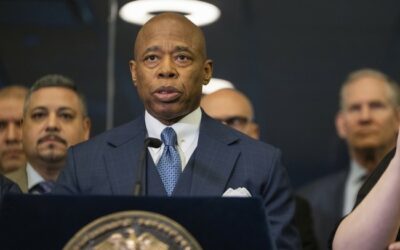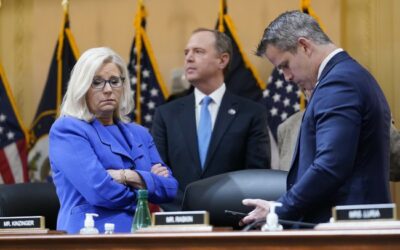In My View by Eric Musgrave: Is having Harrods on your CV now a problem?

Almost 20 years ago I had a very short-lived diversion from journalism into public relations. I soon found being on that side of the communications fence was not for me, but I retain great admiration for people who manage the media well.
How not to handle the press was disastrously illustrated last week. In one of the most bizarre episodes I’ve witnessed in 40-plus years of writing about the retail sector, we saw the Fenwick group withdraw its offer of the CEO’s position from department store veteran Nigel Blow, who has been CEO of Fenwick’s London-based rival Morleys Group for five years.
Blow has also run Brown Thomas and Arnotts in the Irish Republic between 2007 and 2015, so he is a department store man through and through. Those businesses were owned by the Weston family, another department store dynasty, who until recently also owned Selfridges.
Blow has been keeping some good company in his career.
His Fenwick appointment was announced in July. He has been working out his notice at Morleys since then and he was due to start his new job on 17 October. In a shock statement widely quoted in the press, on 2 October the Newcastle-based company stated: “Nigel Blow has informed us that he will no longer be taking up this position”.
Blow directly contradicted that on Friday, 4 October with his own statement. In his version of events, Fenwick chairman Sian Westerman told him the company was “was not able to proceed” with his employment as CEO “in order to safeguard the reputation of the Fenwick business”. He said he had not agreed to Fenwick’s statement.
What appears to have prompted this sudden change of heart on Tyneside is an email sent to Fenwick on 30 September by BBC business news reporter Ben King. Blow said in his statement he has not been given sight of this email.
King’s email presumably made mention of the 90-minute documentary entitled Al Fayed: Predator of Harrods, which was first shown on BBC Two on 19 September; it remains available to see via the BBC iPlayer.
It’s a disturbing and depressing account of the grotesque behaviour of Mohamed Al Fayed, who owned the Knightsbridge store between 1985 and 2010, when he sold it to its current owners, the Qatari royal family.
In the documentary around 20 women recount the sexual assaults, including rape, they suffered from the man who was their all-powerful boss. It is an appalling and sickening saga. One can only hope the women involved have found some relief and even comfort from relating their stories.
It is unclear for how long the programme has been in production. Many will feel, as I do, that it is a shame it has been broadcast only now, more than a year after Fayed died aged 94, so he is not around to answer his victims or face a criminal trial.
In my view, the BBC in recent times has shown a tendency to make “news” stories out of its own output. Accordingly, the Al Fayed programme has led to many former Harrods executives being pressed by the corporation to make a statement about their reaction to the documentary and “what they knew” about Fayed’s repulsive activities.
Blow’s problem – if that is what it is – seems to be that he worked at Harrods from 1992 until 2007 before his move to Ireland to work for the Westons. In his statement, he confirms he held senior positions at Harrods from 2002 until his departure. He had worked mainly in menswear at the Knightsbridge store and was head merchant in his final years.
His statement includes this declaration: “I can confirm that, during my time at the business, I never heard about or witnessed any such behaviour by Mr Al Fayed.
“I did witness, however, numerous instances of employees’ offices, telephones and even cars being bugged, including my own, as well knowing there were times I was followed by security. On multiple occasions I saw transcripts of my own telephone calls on Mr Al Fayed’s desk. Such behaviour prompted me to seek alternative employment from 2006.”
It is interesting to note how the BBC presented the situation on an online news item on 2 October, under Ben King’s byline. It reads: “A long-serving former Harrods executive has decided not to become the boss of department store Fenwick despite being due to start this month, the BBC has learned.
“Nigel Blow worked at Harrods for 14 years from 1992 to 2007, a period when the luxury London store was owned by Mohamed Al Fayed.
“It comes after the BBC broadcast a documentary last month based on the accounts of more than 20 women who said they had been sexually assaulted or raped by Al Fayed while working at Harrods.
“Following the allegations against Al Fayed, Mr Blow declined to answer multiple requests for comment. A day after contacting Fenwick, however, the BBC was told he would no longer be taking the role.
“The BBC first attempted to contact Mr Blow on 21 September – and received no response to multiple subsequent requests.
“On 30 September Fenwick was contacted to ask if it had any comment to make about the documentary and Mr Blow’s long-standing links with Harrods.
“About 24 hours later, Fenwick told the BBC: ‘Nigel Blow has informed us that he will no longer be taking up this position.’
No reason for the decision has been given.”
As a journalist, I was intrigued by the construction of this story, which in my view is laden with innuendo against Blow, who I have known, although not well, since his later years at Harrods. I was interested that the BBC claimed to have first attempted to contact him on 21 September, which was a Saturday. How did they do that, I wonder.
I was intrigued too about phrases like “Mr Blow declined multiple requests for comment” and “The BBC…received no response to multiple subsequent requests”. How many is “multiple” and how were these requests delivered? If Blow declined, he must have responded, mustn’t he? There is some very slack journalism here.
In his statement of 4 October, Blow asserted: “The BBC claims I have declined to comment on multiple occasions, but not once has any enquiry reached me personally. On Thursday 26th September Ben King from the BBC sent an email via the Morleys general enquiry email.”
I am not sure an email sent to a company’s generic enquiry address qualifies for an investigative journalism award, but others may think differently.
The BBC story also includes what I regard as another “nudge, nudge, wink, wink” reference: “In 2013 (Blow) took up a post with another Fayed company – this time as managing director of Turnbull and Asser, the shirt-maker with a Royal Warrant from Prince Charles. It is owned by the Fayed family and chaired by Ali Fayed, Mohamed’s brother, where he stayed until 2017.”
Ignoring the odd syntax in the final sentence, my memory on this is that Mohamed’s two younger brothers, Ali and Salah, were working with him at the time of the Harrods acquisition in 1985. Among the group’s many assets, I think, were Jermyn Street-based Turnbull & Asser (aka T&A), the premium footwear business Kurt Geiger and a private jet company, Harrods Aviation. It was a retail mixed bag.
My understanding for many years has been that Ali began to distance himself from the increasingly eccentric Mohamed soon after the Harrods purchase and at some stage acquired and took sole control of T&A. I have never met Ali Al Fayed but people who have always told me, “He’s a real gent – nothing at all like his brother.”
In his statement, Blow writes: “Reference has also been made to me joining Turnbull & Asser as Managing Director in March 2013 on return from Ireland, this company was privately owned by Mohammed Al Fayed’s brother, Mr Ali Fayed and his 3 sons whom I hold in very high regard, they live in the US and I do not believe they would have known anything about these terrible allegations in Harrods. Mohammed Al Fayed was nothing to do with the ownership of Turnbull & Asser.”
I wonder why the BBC’s King thought T&A worthy of mention. Did not the fact that Prince Charles awarded the firm a Royal Warrant suggest to him that it may have been somewhat different to Harrods? I note King Charles has just renewed the menswear firm’s Royal Warrant.
What struck me most about the BBC’s stance in its news item is its apparent lack of any appreciation for the context here. Blow had two weeks or less to go at Morleys and had not yet joined Fenwick, so he was effectively between two management seats.
The enquiry from the BBC referenced Blow’s time at Harrods 17 years or more earlier. Why should Morleys get involved? This is a much-admired store business, operating eight stores mainly in and around London, including Elys of Wimbledon and Morleys of Brixton. It is wholly owned by Bernard Dreesmann, a gentleman who I know to be as charming in private as he is publicity-shy in his professional life.
It is not widely known that today’s group has its roots way back in 1927, when Dreesmann’s grandfather bought what was then the Morley and Lanceley store in Brixton.
I have known Dreesmann for many years and while he is happy to chat about business off-the-record, he always insists he is not quoted. While this might be frustrating for Very Important People like me and Ben King at the BBC, he is entirely in his rights as the owner of a private company.
I was not at all surprised, therefore, to learn that Morleys Group did not immediately respond to the BBC email. It may have been ill-advised and lacking in media savvy to take this approach, but it is not sinister or a crime.
In an odd coincidence, the other department store business that most reminds me of Morleys Group is Fenwick. Also private, also family-owned, it is only in the past 20 years or so that you will find much written about Fenwick in the business media. When I started in the industry in 1980 I was told not to bother calling the company because it did not talk to the press.
Also, like a British C&A, Fenwick was famous (or infamous) for having only men, virtually all Fenwick cousins, on its board. That too has changed in recent years. Sian Westerman, who is an investment banker with Rothschild & Co, was made Fenwick chairman earlier this year, having been a non-executive director since March 2019.
Similarly to my experience with Bernard Dreesmann, I have long had cordial relations with former chairman Mark Fenwick and his cousin Adam. When we met in social occasions, they were always happy to swap notes and news, but all off the record.
Founded in Newcastle in 1882 by John James Fenwick, it runs eight stores. About 10 years ago, when discussing the company with a contact, it was suggested to me the family wanted to keep the business but wanted others to run it.
Therefore, since 2017, when the Fenwick family stepped back from “active duty”, the company has had four chairmen (including Westerman). Blow would have been its third CEO in seven years, following well-regarded retail industry professionals Robbie Feather and John Edgar. (Edgar, by coincidence, also has Harrods on his CV: he was its CFO during 2012-2017 in the post-Al Fayed era).
I wonder what, if anything, the Fenwick family shareholders knew of the decision to cancel the offer of the CEO’s role to Blow.
So where are we now after last week’s proceedings? Nigel Blow will have no job in about a week’s time and his professional reputation has been tarnished. As he put in his statement, Fenwick seems to have found him “guilty by association” due to his time at Harrods. He added: “I believe Fenwick’s action is unjustified, unfair and in breach of contract”.
Morleys Group is presumably still looking for a CEO. Fenwick is presumably looking for a CEO again. And we are no further forward with any knowledge about who knew what, and when, during Al Fayed’s grim tenure at Harrods.
It is worth mentioning that any pretence of respectability for the Egyptian-born egomaniac was exploded only a couple of years after he acquired Harrods by an extensive expose called A Hero From Zero, funded by his business rival, Roland “Tiny” Rowland, who also wanted to buy Harrods. The book rubbished Al Fayed’s claim to be from a wealthy Cairo dynasty and highlighted various murky business dealings.
Additionally, reports of Al Fayed’s sexual predatory nature go back at least as far as an article in Vanity Fairmagazine in 1995, which is mentioned at length in the documentary. British news magazine Private Eye was also writing about his inappropriate behaviour towards female staff not long afterwards. In a piece from the issue of 29 May 1998 that has been reprinted in a recent issue of the Eye, Fayed is referred to as “the revolting old lecher”.
Given this background, the BBC documentary prompts the question: why has all this come out again now? The programme mentions that since last year the current owners of Harrods have been settling claims from women who allege they suffered sexual harassment and much worse from Al Fayed.
A class action against Harrods alleging what amounts to corporate failure to protect staff is underway; lawyers involved in this initiative appear in the programme.
Since the September 19 broadcast, the BBC has kept the Fayed story active by contacting former and current Harrods staff for “comment” and posting “news” stories on this. Their implication appears to be that some, or many, people at the store must have known about Fayed’s activities.
In preparation for this feature, I contacted both Fenwick’s press office and the BBC press office to clarify several points.
On behalf of Fenwick, I received a response from Milltown Partners, a “global reputation and policy advisory” firm. It states: “Fenwick will not be making any further comment on the record. Please refer to its original statement: ‘In July 2024, we announced that we would be appointing Nigel Blow as CEO of Fenwick. Nigel Blow has informed us that he will no longer be taking up this position.’
From the BBC, the response was: “We stand fully behind our journalist and our journalism. This story, which was fully in the public interest, was produced in line with the BBC’s editorial standards, including contacting Mr Blow before publication.
“Mr Blow himself acknowledges in his statement that we contacted him via his then employer: On Thursday 26th September Ben King from the BBC sent an email via the Morley’s general enquiry email. As it is 18 years since I worked at Harrods, and I was about to leave the business, it was decided internally that, as CEO of Morley’s, I should make no response.”
Neither response addresses any of the key questions I posed about this sorry tale. Neither Fenwick nor the BBC responded to my request to see the BBC email sent to Fenwick on 30 September.
Are we now to presume that anyone who worked at Harrods in a senior role between 1985 and 2010 is unemployable? If so, that must apply to dozens, if not hundreds, of industry people. What further media coverage will appear now?
Postscript: I do not like the modern world’s obsession with email. I know from previous experience that Fenwick’s press office does not allow the firm’s switchboard operators to give out the names of anyone in the media team or to provide any telephone numbers. You have to email press@fenwick.co.uk. Not a good communications policy in my book, but all too common these days.
Funnily enough, earlier this year, editor Lauretta Roberts and I agreed a feature on Fenwick would be interesting for theindustry.fashion. With the subject matter “An interview with John Edgar”, I wrote a polite email request that stressed, “We are very interested in finding out more about the plans for what is now the largest and most successful independent / family-owned department store business.”
I mentioned I knew senior members of the Fenwick family. I believe a request from a well-regarded outlet like theindustry.fashion merits a response. I am also immodest enough to think I deserve a polite reply too.
I sent the email at 5.13pm on Wednesday, 7 February. Eight months later, I am still waiting to hear back from the Fenwick press team on this. Perhaps a new CEO, when he or she starts, will improve the company’s communication performance.









